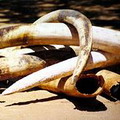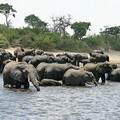 「瀕臨絕種野生動物國際貿易公約」 (CITES)在1989年規定禁止各類象牙交易,保護這些受盜獵威脅的瀕絕動物,爾後卻於15日在瑞士日內瓦的會議中,決議以一次性例外的名義,允予非洲南部四國出口總重量達108公噸的公有象牙。
「瀕臨絕種野生動物國際貿易公約」 (CITES)在1989年規定禁止各類象牙交易,保護這些受盜獵威脅的瀕絕動物,爾後卻於15日在瑞士日內瓦的會議中,決議以一次性例外的名義,允予非洲南部四國出口總重量達108公噸的公有象牙。
這是自禁令施行以來第三度通過象牙貿易行為。由CITES 33個成員國組成的常設委員會已於2007年6月初,授權波扎那、奈米比亞、南非和辛巴威四國販賣象牙。
委員會於此次會議中,亦同意中國擁有象牙合法進口國的地位,而日本則已在2006年取得象牙進口的資格。兩國官員皆擔保將會監督國內市場中象牙商品的流向,以掌握市場上任何對此貴重物品蠢蠢欲動的非法買賣活動。
CITES秘書長韋斯特克(Willem Wijnstekers)表示,「秘書處將會密集監督此次貿易的後續發展,並且評核此對非洲象群的影響。我們將持續觀察中國與日本對於國內市場貿易的把關能力,是否有效遏制肆無忌諱的商人趁機兜售來路不明的非法象牙,以謀取暴利」。
此次例外性象牙貿易的收入,將全數投入象群保育工作,以及發展與象群比鄰而居之當地居民的福利計劃。
中國已設法說服CITES常設委員會及保育團體,對於國內象牙買賣的規範和非法交易的防制,自有其一套處理方式。中國政府一方面不但可以促進解決盜獵、走私與強制執行等議題上的國際合作,在配合關懷保育計劃的原則下,亦可對海內外僑民宣導,任何自中西非購得之象牙皆屬違法,儘管此區域時常公開非法販售象牙。
然而其他保育人士對此則大感不認同。「生而自由基金會」(Born Free Foundation)執行長兼「物種存續網」(Species Survival Network)主席崔佛斯(Will Travers)直呼:「難以致信、天真且大錯特錯。」「2006年放行日本成為貿易夥伴已經很荒謬,這次甚至同意中國加入,就我看來,等於是火上加油。」
 崔佛斯指出,中國國內尚欠缺全面性的強制規範與貿易管制,且向來是非法象牙的固定輸入國。他估計平均每年有20,000至25,000頭大象在盜獵者的槍管下喪命。儘管CITES於2004年制訂出打擊非法象牙交易的行動綱領,不過截自目前為止,除衣索比亞外,其他地區的實行成效仍舊不彰。
崔佛斯指出,中國國內尚欠缺全面性的強制規範與貿易管制,且向來是非法象牙的固定輸入國。他估計平均每年有20,000至25,000頭大象在盜獵者的槍管下喪命。儘管CITES於2004年制訂出打擊非法象牙交易的行動綱領,不過截自目前為止,除衣索比亞外,其他地區的實行成效仍舊不彰。
在合法買賣過程中,公有象牙的主要取自於自然死亡的大象或是問題大象的管制等。今日,所有非洲南部包括波扎那、奈米比亞、南非及辛巴威區內的所有象群,皆被列名於CITES附錄二之中,使其得以於公允機制下進行貿易活動。就此之外的象群則被歸入附錄一之中,禁止所有帶有商業目的的進口行為與其有關。
根據世界自然保育聯盟(IUCN)暨物種存續委員會非洲象專家小組的報告顯示,雖然目前東非與南非等亞區內象群數量穩定成長,然而在其他地區則不易判斷是否亦呈現成長趨勢,問題最主要在於無法蒐集充份的資訊,來說明整個非洲大陸象群增減動態。
Four southern African countries have been approved to sell a total of 108 metric tonnes of government owned elephant ivory as a one-time exception to the international moratorium on ivory sales that has been in place since 1989 to protect these endangered animals from poachers. The decision was taken today at a meeting of the Convention on International Trade in Endangered Species, CITES, in Geneva.
It is the third such sale permitted since the ban took effect. The 33 member CITES Standing Committee has authorized the ivory sale that was agreed in principle in June 2007 for Botswana, Namibia, South Africa and Zimbabwe.
The Committee also agreed to designate China as an importing country. Japan had already been allowed to import ivory in 2006. Officials of both countries said that they would monitor their domestic markets after purchasing the ivory to detect any increase in illegal sales of the valuable material.
"The Secretariat will closely supervise this sale and evaluate its impact on elephant population levels throughout Africa. We will continue monitoring the Chinese and Japanese domestic trade controls to ensure that unscrupulous traders do not take this opportunity to launder ivory from illegal origin," said CITES Secretary-General Willem Wijnstekers.
All the proceeds of the sale are to be used exclusively for elephant conservation and development programs for the benefit of local communities living side-by-side with elephants.
China has managed to convince the CITES Standing Committee and also conservation groups of its ability to manage regulated sales and tackle any illegal domestic ivory trade. The Chinese government could help to improve international co-operation in tackling poaching, smuggling and enforcement issues, and with conservation awareness programs that send out a clear message to Chinese nationals abroad that it is illegal to buy and bring home ivory from West and Central Africa, where it is sometimes sold openly and illegally.
But other conservationists are not convinced. "Unbelievable, naïve and deadly," said Will Travers, CEO of the Born Free Foundation and president of the Species Survival Network. "It was bad enough when Japan was approved as a trading partner more than a year ago but approving China is, in my view, like pouring petrol on an open fire."
Travers says China lacks comprehensive internal law enforcement and trade controls and is on the receiving end of a steady stream of illegal ivory shipments. He estimates between 20,000 and 25,000 elephants a year are killed by poachers. In 2004, CITES Parties drew up an action plan for tackling problem ivory markets, but so far, with the exception of Ethiopia, progress has been slow.
Legal sales of ivory derive from existing stocks gathered from elephants that have died as a result of natural causes or from problem-animal control. Today, the elephant populations of southern Africa, including those of Botswana, Namibia, South Africa, and Zimbabwe, are listed in CITES Appendix II, which allows commercial trade through a permit system. All other elephant populations are listed in Appendix I, which prohibits all imports for commercial purposes.
According to the IUCN Species Survival Commission's African Elephant Specialist Group, although elephant populations may at present be stable or increasing in some sub-regions such as Eastern and Southern Africa, the trend is unknown in other regions, and "overall there remains insufficient information to venture a current trend at the continental level."
全文及圖片詳見:ENS





